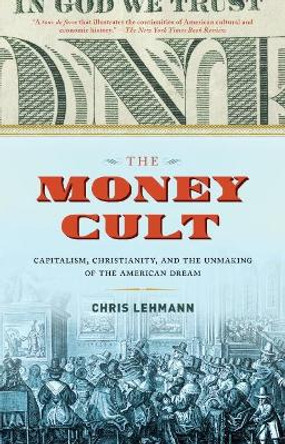Description
"Social criticism at its scorching-hot best." Barbara Ehrenreich
"Think H.L. Mencken crossed with Jon Stewart." The Phoenix
In Rich People Things, Chris Lehmann lays bare the various dogmas and delusions that prop up plutocratic rule in the post-meltdown age. It's a humorous and harrowing tale of warped populism, phony reform, and blind deference to the nation's financial elite. As the author explains, American class privilege is very much like the idea of sex in a Catholic school it's not supposed to exist in the first place, but once it presents itself in your mind's eye, you realize that it's everywhere.
A concise and easy-to-use guide, Rich People Things catalogs the fortifications that shelter the opulent from the resentments of the hoi polloi. From ideological stanchions such as the Free Market through the castellation of media including The New York Times and Wired magazine, to gatekeepers such as David Brooks, Steve Forbes, and Alan Greenspan, Lehmann covers the vast array of comforting and comprehensive protections that allow the uber-privileged to maintain their iron grip on almost half of America's wealth. With chapters on Malcolm Gladwell, the Supreme Court, the memoir, and more, no one is spared from Lehmann's pointed prose.
Chris Lehmann is employed, ever precariously, as an editor for Yahoo! News, Bookforum, and The Baffler, while dissecting the excesses of his social betters for his column Rich People Things at TheAwl.com. He lives in Washington, DC, with his wife Ana Marie Cox and a quartet of excellent pets.
About the Author
Chris Lehmann is employed, ever precariously, as an editor for Yahoo! News, Bookforum, and The Baffler. He lives in Washington, DC, with his wife, Ana Marie Cox, and a quartet of excellent pets.
Reviews
"This book made me laugh and cry. And wish I were a plutocrat. Chris Lehmann is an amazing writer. I will read his books until I die."
-Gary Shteyngart
"What a delight it is to have-finally!-an entire book in which Lehmann gives the plutocrats of this world the drubbing they deserve-in delicious detail. His scoffing is a tonic."
-Thomas Frank
"I am always searching for books that can educate my six grown-up children, not to mention certain recidivist friends, about how this country came to be seduced, pushed, and betrayed into its present state by the money power and its Wall Street-Washington nerve center. When I read Chris Lehmann's Rich People Things, I was so impressed by its wit, wisdom, and acuity on this matter, by the variety, aptness, and richness of its perceptions and examples, that I bought ten copies to give to family and friends. With my own money. Hard cash. Can I say more? Well, yes, I can. I wish I had written it."
-Michael C. Thomas, author, Love and Money
"Scathing, scintillating chapters on Malcolm Gladwell; on the Times, and on its 'chirpy' and delusional columnist David Brooks; on Wired magazine's breathless paeans to new media's broken promises; and on other ventures and adventurers who, often unwittingly, work hard to suppress or deflect their own and their audiences' understandings of what consumer and casino-finance capitalism are doing to us."
-Talking Points Memo
"Lehmann began his economic blog inspired by 'the omission of real economic conditions from the accounting of the republic's collective life.' Now in book form . . . Lehmann illustrates the ideas, institutions, and individuals he sees as tools for the rich to keep themselves rich-or make themselves richer. The list of offenders includes the US Constitution, the iPad, Reality TV, and the New York Times (in particular, columnist David Brooks). The author explores meritocracy, class warfare, the 'powerful intellectual opiate' called the free market, and other 'hoary American myths.' Chapters include a description of Atlas Shrugged as a 'doorstop-sized digest of ideological boilerplate disguised as fictional dialogue, plotting, and character development' and memoirs, or 'memoirs,' (James Frey makes the list) that allow affluent readers to 'cast one's fellow citizens as monolithically soulful, suffering, and exoticized others.' Lehmann concludes his wholly entertaining effort with a particularly astute explanation of how the myth of the middle class has left Americans with an inadequate vocabulary to discuss economic woes; instead, 'we are committed to the dogmatic belief that we are all affluent entrepreneurs waiting to happen.' Brutal."
-Publishers Weekly
"Perusing Mr. Lehmann's volume I found myself wondering, again and again, what exactly is the target psychographic of this veritable wardrobe montage of proletarian resentments? I visualized: employees of used bookstores and/or independent coffee shops, people who don't own televisions, people who do own televisions on which they occasionally watch Portlandia and other shows they are capable of enjoying with substantial reservations, people who commute to their titular jobs on bicycles they have owned for more than five years, bartenders with a higher than average propensity to reward 'regular' customers with complimentary beverages (thus cheating their bosses, which they excuse by some deluded ethical calculus by which the right to steal is a just reward for being sufficiently overeducated to command the loyalty of 'like-minded' freeloaders), titular business owners foolish enough to employ such mediocrities, people at once eminently capable of constructing formidable and eloquent arguments making the case for socialized health care on the basis of a litany of broad-based macroeconomic factors and yet chronically incapable of holding down jobs that provide health insurance, childish people who know nothing of money and yet ceaselessly attempt to provoke class warfare by plugging loaded terms like rich and millionaire into otherwise civilized conversations about aspirational luxury, tastemaking lifestyles, the urgent need for deficit reduction by way of entitlement reform, etc . . . . 'parasites,' in other words. Given that the authorship of a nonfiction book is widely understood to be an undertaking aimed primarily at marketing one's services as a paid motivational speaker, it's hard to imagine why Mr. Lehmann would squander 256 pages addressing such a fragmented and under-capitalized audience. Having read Rich People Things in its entirety, however, it occurred to me that the parasite class does, at least, have time to read books, and that Mr. Lehmann would be an abysmal
motivational speaker."
-Moe Tkacik, unemployed leftist
"This book made me laugh and cry. And wish I were a plutocrat. Chris Lehmann is an amazing writer. I will read his books until I die."
Gary Shteyngart
"What a delight it is to have finally! an entire book in which Lehmann gives the plutocrats of this world the drubbing they deserve in delicious detail. His scoffing is a tonic."
Thomas Frank
"I am always searching for books that can educate my six grown-up children, not to mention certain recidivist friends, about how this country came to be seduced, pushed, and betrayed into its present state by the money power and its Wall Street Washington nerve center. When I read Chris Lehmann's Rich People Things, I was so impressed by its wit, wisdom, and acuity on this matter, by the variety, aptness, and richness of its perceptions and examples, that I bought ten copies to give to family and friends. With my own money. Hard cash. Can I say more? Well, yes, I can. I wish I had written it."
Michael C. Thomas, author, Love and Money
"Scathing, scintillating chapters on Malcolm Gladwell; on the Times, and on its 'chirpy' and delusional columnist David Brooks; on Wired magazine's breathless paeans to new media's broken promises; and on other ventures and adventurers who, often unwittingly, work hard to suppress or deflect their own and their audiences' understandings of what consumer and casino-finance capitalism are doing to us."
Talking Points Memo
"Lehmann began his economic blog inspired by 'the omission of real economic conditions from the accounting of the republic's collective life.' Now in book form . . . Lehmann illustrates the ideas, institutions, and individuals he sees as tools for the rich to keep themselves rich or make themselves richer. The list of offenders includes the US Constitution, the iPad, Reality TV, and the New York Times (in particular, columnist David Brooks). The author explores meritocracy, class warfare, the 'powerful intellectual opiate' called the free market, and other 'hoary American myths.' Chapters include a description of Atlas Shrugged as a 'doorstop-sized digest of ideological boilerplate disguised as fictional dialogue, plotting, and character development' and memoirs, or 'memoirs,' (James Frey makes the list) that allow affluent readers to 'cast one's fellow citizens as monolithically soulful, suffering, and exoticized others.' Lehmann concludes his wholly entertaining effort with a particularly astute explanation of how the myth of the middle class has left Americans with an inadequate vocabulary to discuss economic woes; instead, 'we are committed to the dogmatic belief that we are all affluent entrepreneurs waiting to happen.' Brutal."
Publishers Weekly
"Perusing Mr. Lehmann's volume I found myself wondering, again and again, what exactly is the target psychographic of this veritable wardrobe montage of proletarian resentments? I visualized: employees of used bookstores and/or independent coffee shops, people who don't own televisions, people who do own televisions on which they occasionally watch Portlandia and other shows they are capable of enjoying with substantial reservations, people who commute to their titular jobs on bicycles they have owned for more than five years, bartenders with a higher than average propensity to reward 'regular' customers with complimentary beverages (thus cheating their bosses, which they excuse by some deluded ethical calculus by which the right to steal is a just reward for being sufficiently overeducated to command the loyalty of 'like-minded' freeloaders), titular business owners foolish enough to employ such mediocrities, people at once eminently capable of constructing formidable and eloquent arguments making the case for socialized health care on the basis of a litany of broad-based macroeconomic factors and yet chronically incapable of holding down jobs that provide health insurance, childish people who know nothing of money and yet ceaselessly attempt to provoke class warfare by plugging loaded terms like rich and millionaire into otherwise civilized conversations about aspirational luxury, tastemaking lifestyles, the urgent need for deficit reduction by way of entitlement reform, etc . . . . 'parasites,' in other words. Given that the authorship of a nonfiction book is widely understood to be an undertaking aimed primarily at marketing one's services as a paid motivational speaker, it's hard to imagine why Mr. Lehmann would squander 256 pages addressing such a fragmented and under-capitalized audience. Having read Rich People Things in its entirety, however, it occurred to me that the parasite class does, at least, have time to read books, and that Mr. Lehmann would be an abysmal
motivational speaker."
Moe Tkacik, unemployed leftist
Book Information
ISBN 9781608461523
Author Chris Lehmann
Format Paperback
Page Count 280
Imprint Haymarket Books
Publisher Haymarket Books
Weight(grams) 311g







